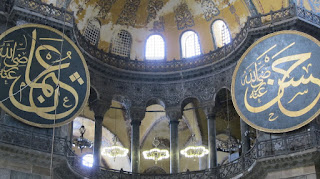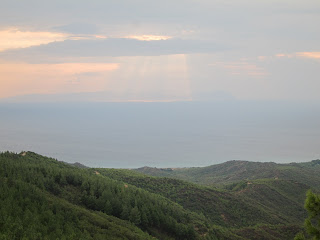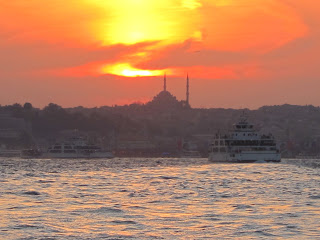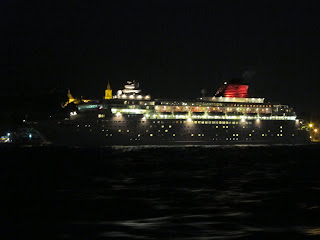Ok, the horns. I don't mean the Golden Horn, which splits the European side of the city in two. I'm referring to the horns on people's vehicles. In Istanbul there's 20 million of them. This is assuming that each vehicle has one horn - if the taxi drivers could have multiple horns, they'd be in heaven.

The traffic moves at around 2 mph, all furiously beeping away at each other with unnecessary regularity. In more sober parts of the world, beeping the horn is used as the last resort, to avoid an accident or to scold somebody for careless driving. Here, beeping the horn is usually the first resort. Often it's an attempt to get the traffic moving, but it rarely works. In a log jam of 20 taxis, 19 of them beep away like mad, imploring the leading car to stick his foot down and run over some tourists, or smash into the tram passing in front of him, or whatever happens to be blocking his path. Obviously, he can't do this - nor would they. Consequently the horn has lost all of its effect, as it's so utterly pointless, like two chihauhas yapping at each another from opposite sides of a fence.




There are 17 million people in Istanbul, and three million more cars. It's hard to fathom - you couldn't build a more car-unfriendly city if you tried. There's an extensive shuttle ferry network here, and a series of reliable tram and metro lines. But still the cars keep coming. Bikes. Vans. Full-sized coaches that happily drive down steep lanes that an Englishman would fret about taking his Fiat 500 through. It's just mental. They say driving a Formula 1 car in Monaco is like riding a bycicle around your living room. The same is true of Istanbul, but with a motorbike.
It's also unclear as to who's really in charge of the system. It seems that any bloke off the street can command an entire fleet of taxis provided he can speak five words of English or German. One guy outside Yenikapi ferry terminal was sat on the curb cooking a couldren of mussels, yet when I gave off the merest hint that I was looking for a cab, he leapt up, greasy prongs still in hand, and hurried me into the back of a taxi, only to find a petrified Chinese man sat in the passenger's seat. "15 Lira," he informed the driver, which was less extortionate than I was expecting.
Buying a product of any description in Istanbul is a bit of a nightmare. Price tags? Forget it. The item is worth whatever the shop keeper pulls out of his arse on that given day. You can't just go in and browse, as they're in your face quicker than the two gentleman's outfitters in the Fast Show. You're subjected to a barrage of pleasantries, each expertly tailored to part you with your cash. If you're not careful you can come out of a shop having bought something entirely different from what you originally wanted, such is the effectiveness of their camaraderie. Imagine those irritating Cockney fruit sellers, but at every shop, bar and restaurant. You just have to smile and fob them off.
Topkapi Palace


Last week, having lost my sunglasses, I went out to a nearby street to buy a new pair. Distrusting the knock-off street merchants, I went to a sunglasses shop. I wasn't allowed to try on anything myself, or even examine a pair. Instead I was lined up in front of a mirror, where the shop keeper took a pair off the shelf at random and placed it carefully on my head, lining them up as if he were the Sultan's personal optician. I told him that I was happy with the pair he had selected - after all, sunglasses are sunglasses - but he insisted on forcing more and more pairs on me, again placing each one on my head with the care of someone excavating a dinosaur fossil. Intriguingly, his selection of glasses became progressively more expensive. They all looked the same, so I stood firm on my choice and bought the first one, much to his visible disappointment.
There are more sinister ways to get ripped off, however. The other night I was walking back to my hostel when I was approached by a middle-aged man who asked me for the time. This evolved into a good-natured conversation about his 'friend' in London who he visits occasionally. He then asked me if I would like to come back to his 'cafe' for a 'smoke.' I was pretty tired, so I declined. After this, he didn't want to know me. The next day I found out from a travel website that this sort of thing happens regularly to single male travellers in this part of Istanbul. Usually you are taken to a bar, where after a few drinks you are presented with an extortionate bill (say $500.) If you don't pay up then you'll be taken to a 'back office' and threatened with physical abuse. Some people have even been threatened with death, which I've never really aspired to myself. The problem is that Turks in general are very friendly and hospitable, which makes it easier for the shady types to operate.
There are more sinister ways to get ripped off, however. The other night I was walking back to my hostel when I was approached by a middle-aged man who asked me for the time. This evolved into a good-natured conversation about his 'friend' in London who he visits occasionally. He then asked me if I would like to come back to his 'cafe' for a 'smoke.' I was pretty tired, so I declined. After this, he didn't want to know me. The next day I found out from a travel website that this sort of thing happens regularly to single male travellers in this part of Istanbul. Usually you are taken to a bar, where after a few drinks you are presented with an extortionate bill (say $500.) If you don't pay up then you'll be taken to a 'back office' and threatened with physical abuse. Some people have even been threatened with death, which I've never really aspired to myself. The problem is that Turks in general are very friendly and hospitable, which makes it easier for the shady types to operate.



Haghia Sophia
I met a German guy, Michael, who was staying in my dorm. He made me think a little more about money, and how to save it whilst abroad. Michael kept a daily log of exactly how much cash he had spent, and where, so that he was always on top of his finances. A model of prudence, I thought, until he told me that last year he and his friends spent over €15,000 on cocaine, and that he would fly to Paris or Berlin for one night just because he was bored. Not a bad way to blow your cash, I thought, but it had clearly changed his attitudes toward money. From now on, maybe I should take a leaf out of Michael's book, and spend my money on cocaine - I mean, keep a daily log of my spending.
The best way to experience Istanbul is to take one of the many shuttle ferries that connect the three sides of the city. They cost about 70p for a ride, and can take you almost anywhere. I boarded one at six in the evening to get back to my hostel, but inadvertently took the wrong trip and ended up heading for the Asian side (I confused Karakoy with Kadikoy. Shocking.) This turned out to be the highlight of the week.
I've never before encountered a place where so many people are doing something as in Istanbul. No one ever relaxes here, except the tourists. Whole jobs have been invented just to keep people occupied - take the poor sod I saw pushing a wheelbarrow of bottled water from restaurant to restaurant, inquiring if their stock was low. Invariably the answer would be a "no," and he'd go trundling along to the next stall. It's also incredibly easy to get lost, as I found out as soon as I had gotten off the train. I said to myself, "whatever happens, I'm not going to get caught in a crowded market with all my luggage." Two minutes later I was stuck in the spice bazaar, frantically rotating my map, wondering why the hostel couldn't just come to me instead.
Istanbul is a place that you can be totally fed up with one day, and in thrall to the next. It plays by its own rulebook - I guess that's what makes it so special.



I wanted to spend a couple of days out of town, so I bought a ferry ticket to Bandirma, where I would take the bus to Gallipoli. I dragged my bags half way across the city to the ferry terminal, and was not best pleased to find that it had been cancelled. I tried to take a different bus, which would take me all the way there, but I missed the last one by five minutes. I wasn't going to get put off that easily, so I hastily booked an organised tour to Gallipoli for the next morning, with a visit to Troy thrown in for good measure. I thought this would guarantee my arrival, and that I wouldn't have to worry about a thing. The next morning I fell asleep on the bus, and woke up to this...
For about half an hour we looked on as this great brown river swallowed whatever town we were passing through. The driver had sensibly taken us to a junction high up on a road bridge, otherwise we would have been royally stuffed. After we had escaped the deluge, everyone's bags were taken out of the hold for inspection, all of them soaking wet - except mine, which I had stowed away back in Istanbul, anticipating such a biblical event. The Aussie passengers, who comprised most of our party, had no such luck.
We got there in the end, after 6 hours on the coach, and were treated to a decent lunch on the shores of the sea of Marmaris. The Gallipoli peninsula is stunning - much of it is a national park, and has been protected from development. The area is dotted with different cemeteries and memorials to the war dead - British, Australian, Kiwi, French, and, at the highest point of the peninsula, the Turkish, who lost more lives than any. Our tour guide explained in detail the calamity that was the Allied invasion in 1915 - firstly landing at the wrong beach, a mile along the coast from the intended spot; then the bloody charge up the steep hills and valleys; and the brutal trench warfare which dominated most of the campaign. At one point the ANZAC (Australia and New Zealand Army Corps) and Turkish trenches were only eight metres apart. Both sides swapped gifts - food, cigarrettes etc. - until the orders came to fire, at which point they would shoot at each other without mercy.
As the months dragged on, the corpses were piled so high that it was possible to walk from one trench to the other without your feet touching the ground. Dysentry spread fast, and claimed more lives than the actual fighting. Some men were so weak from disease that they fell into the latrines, where they literally drowned in their own mess. The Turks always had the higher ground, and simply waited for the Allies to launch over the top of the trenches to be fired upon. At one point the massacre was so bad that the Turkish general ran across to the New Zealand trench shouting 'Dur! Dur! (Stop! Stop!)', because his men couldn't bear to slaughter yet another futile charge of ANZAC troops. By the end there were half a million dead or injured on all sides. It's hard to comprehend that a place as beautiful as the peninsula could have borne witness to such losses.





The next day we were taken to Troy. My camera's battery had run out, which became more of an irrelevance as the day went on, as there was nothing really worth taking a photo of. 90% of the site is still underground, and much of what isn't was destroyed by a German archaeologist/treasure hunter named Heinrich Schliemann, who bulldozed through the site in the 19th century looking for gold necklaces. The day was memorable only for the Japanese tour group who asked whether the 50ft wooden mock-up of a Trojan horse was the original.
I got on well with the Aussies, who took me under their wing as the only solo traveller among us. All of them generously offered to put me up if I ever were to head Down Under. I can't promise anything, guys, but if I can't get into China...











looks awesome, I wanna go!
ReplyDelete